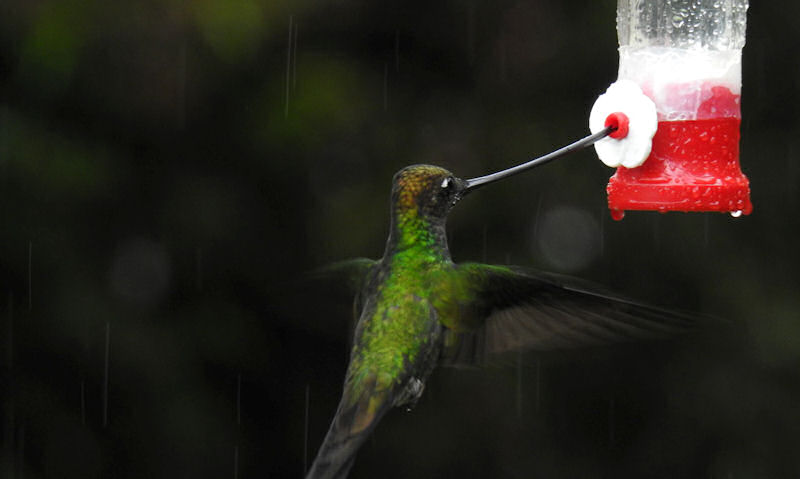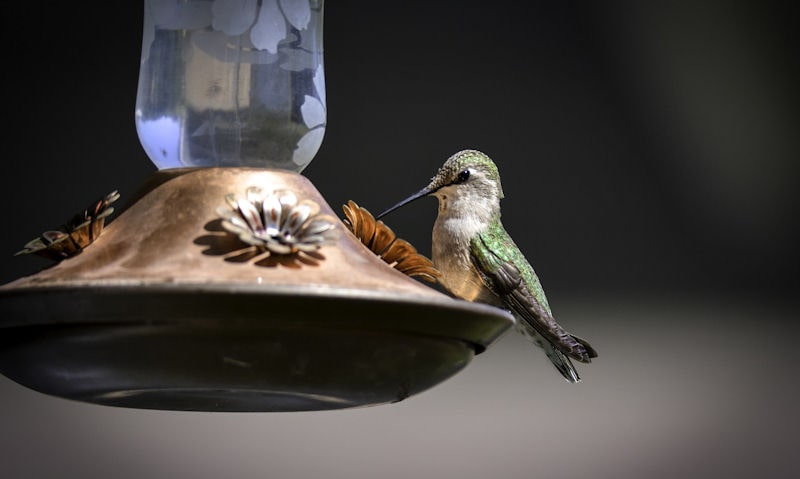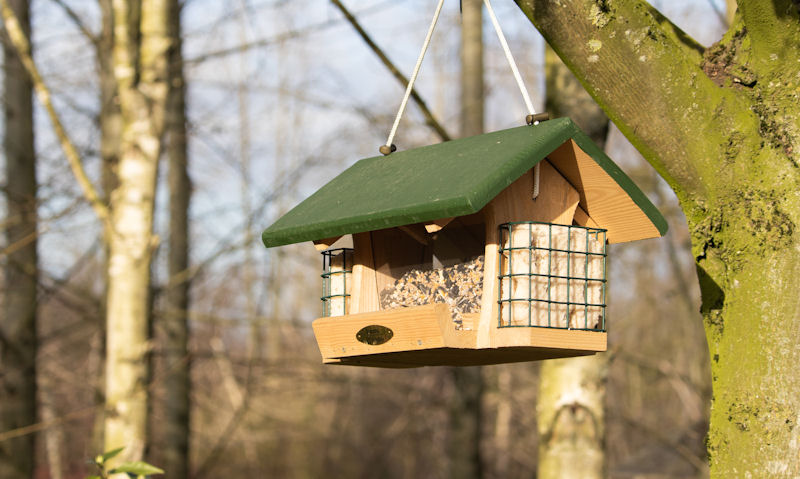Does rain get into Hummingbird feeders
With all bird feeders along with its food able to get wet, homemade nectar does risk spoiling if rain gets inside, thus its vital this can never happen, despite very low risks.
Rain does get into a Hummingbird feeder at times but if there's no signs of leaking then rain water is unlikely to creep inside the feeder. Cheaper feeders are the culprit as gaps between the sections will allow water to run in. Diluted nectar can have consequences as Hummers don't get a proper intake of energy.
It may seem impossible for rain water to seep into the interior of a hummingbird feeder, but it can't be something you can dismiss so early on, with risks being very real.
Rain water of all things does risk weakening the nectar stored away inside the feeder, which must always start at the recommended 1 to 4 ratio - then you could end up with the sugar contents being way below the level it must be at if mixed in with rain water.
What you end up with is a diluted homemade sugar-water nectar which now doesn't contain enough energy for hummers to get through the day.
Replace a poorly sealed hummingbird feeder if its visibly leaking, because if nectar can get out, then rain water can creep inside.
Of course where you hang a hummingbird feeder can at least keep it rain proof, like the underside of a porch or tree covering can protect the hummingbird feeder.
To avoid rain water seeping into a hummingbird feeder, taking the feeder indoors every time it rains is never the solution - as hummers continue to sip nectar within feeders, even when it rains.
Hummingbird feeders themselves can get soaked by the rain, and so to can a little rain get inside the feeder.
If it appears the hummingbird feeder is being flooded by rain water every time it does rains, then that is a problem that must be eradicated.
Rain water will only seep into a feeder with faults in what should be sealed connections between all parts. Rain won't be seen to enter at the part wells but is can make its ways anywhere on the body that has holes or gaps in leading to the interior.
Rain can seep in cheap feeders
Its absolutely possible rain can get into a hummingbird feeder, if the feeder in question is a cheap model or indeed is faulty.
When it rains obviously the rain water is allowed time to settle on the feeder, all while finding its way into all cracks and crevices.
Most likely place water will settle is in any place the water can flood, like the connections or what are joints between sections - where the gaps are too wide, thus the rain water eventually gets in.
Now it has to be said its unlikely rain water can get into the glass or plastic reservoir which stores the homemade sugary-water nectar - but it certainly possible water on the outside can seep within.
Cheaper feeders that are particularly made in plastic tend to warp or expand due to wear and tear, thus this would be the probably culprit of rain getting into the feeder.
Its not just cheap hummingbird feeders either as its possible even top rated hummingbird feeders can lead to water getting inside - but what is more important is that the Hummingbird feeder - or the indeed Oriole feeder itself doesn't leak nectar.
Rain gets in, nectar runs out
With a leaking hummingbird feeder a likely cause of nectar escaping what should be a tight, secure nectar reservoir, this is where rain water creeping into the feeder can happen.
Why does your hummingbird feeder leak is because the joints are loose, not tightened enough, or indeed there's a flaw in the design.
Where nectar is seen to spill out of the hummingbird feeder will be where the rain on the outside, can seep in.
Let me just say though for rain water to creep inside of a hummingbird feeder - or indeed a similar Oriole nectar-filled feeder... it doesn't matter one iota. Hummingbird feeders, or indeed the nectar cannot be spoiled due to little rain mixing inside.
Certainly rain can weaken the nectar mix ratio if too much rain water gets in the feeder, but that is unlikely unless all faults on the feeder is beyond bad.
What you must do in order to prevent rain getting into what should be a vacuumed sealed feeder, is recognize where the nectar is leaking, to then create a seal.
Where nectar leaks is basically where rain water can get into the hummingbird feeder.
Diluted nectar possible
I have said that if rain water can get inside of a hummingbird feeder, there's little chance the rain water can spoil the nectar.
But in case it can and you believe there's a risk of such a mishap happening to your hummingbird feeder, then let's take a look at the consequences.
Well, what will be a 1 to 4 ratio between water and sugar, will see the 1 part sugar ratio becoming far less than the recommended measurements. All that will happen is the homemade nectar mix becomes too weak.
OK that may seem fine but its important to remember, hummingbirds could suffer if only what they're sipping on is a highly diluted with rain water mixture.
Hummingbirds will risk not taking in enough energy filled homemade nectar which can effect their health later on.
I will say if rain does get into a hummingbird feeder it can effect the hummers themselves, rather than the interior of the feeder. In fact, plain water can't effect a hummingbird feeder, no more than sugar water can.
Homemade nectar must be made at a perfect 1 part sugar to 4 parts water ratio; never should it contained too much sugar as it risks damaging a hummers liver - whilst too much water can dilute the nectar which can render it useless for hummingbirds.
To summarize
I think its safe to say rain water can get into any hummingbird feeder, with the risk being minimum, as little rain water is bound to creep in.
Rain can rest on the hummingbird feeder which will see it potentially flood connections between the feeder sections. If the parts aren't sealed tight then rain water will gradually creep in.
If there's no leaking of nectar seen at any point then the likelihood of rain water getting inside a hummingbird feeder, is minimal.
Rain can settle on all the port wells where hummers sip nectar out of, which can delay their feeding time - but in all you shouldn't expect rain water to spoil the nectar - nor will it do any damage to the feeder.
Let's say too much rain water has managed to seep into the hummingbird feeder, well the worse thing that can happen is the homemade nectar mix becomes spoiled.
It may seem harmless at first but let's not forget, the nectar can become too diluted which means hummingbirds will unknowingly sip nectar with far too less energy intake.
Result of that could be hummers feeling weak later in the day with not enough intake of properly made up nectar, which would now be spoiled by rain water.


